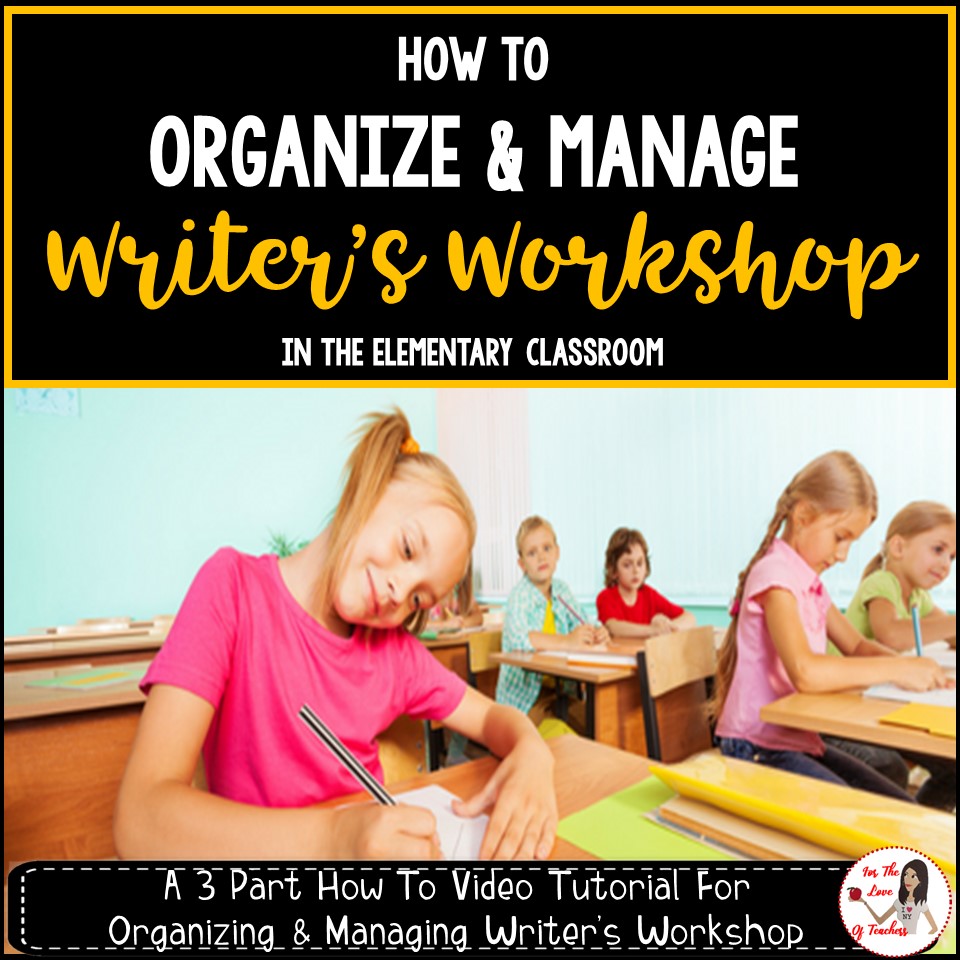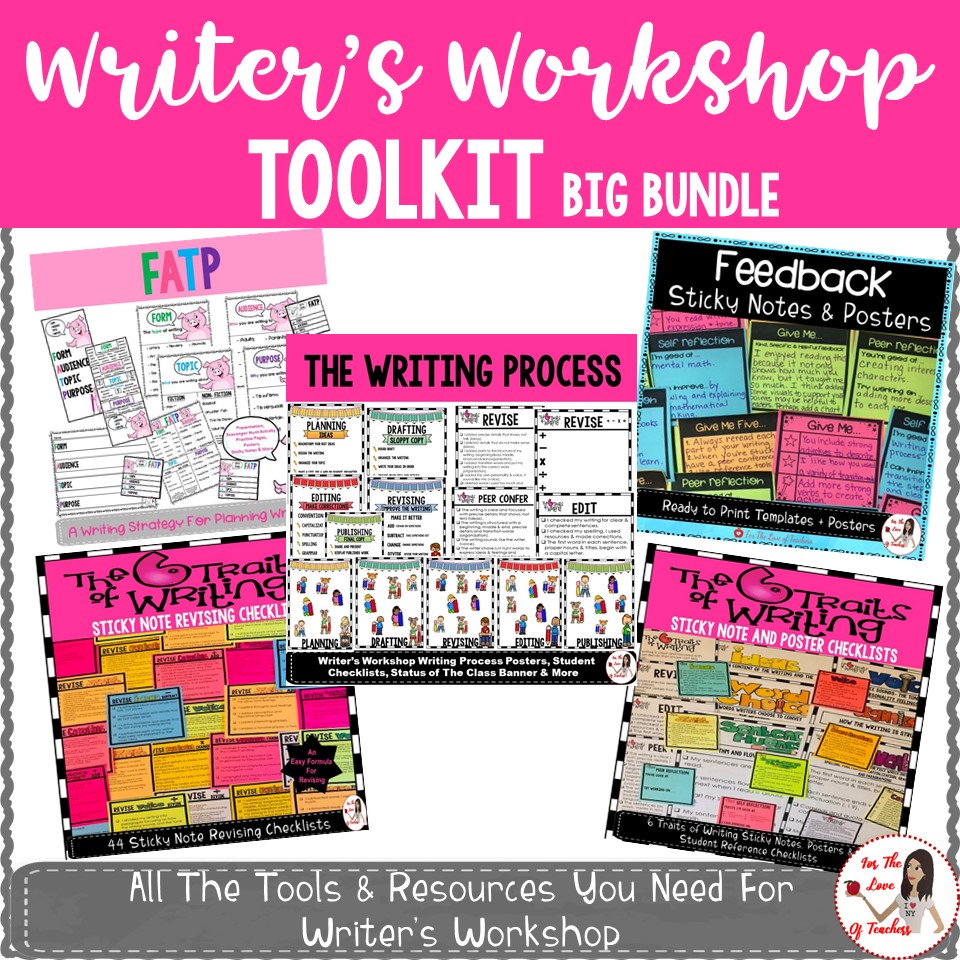Is your Writer’s Workshop an epic fail? Do you hate to write and even more so hate to teach it. Many teachers feel this way and as a result, don’t teach writing at all. They say they do not have the resources or the time to teach writing and would rather spend more time teaching other subjects like reading and math, or walking barefoot on glass 😉.
Why is Teaching Writing So Hard?
Let’s hear what a few teachers have to say about teaching writing:
Lori, a second-grade teacher who blogs at Kinder Lake, says, “It can be tricky to teach writing because it’s tough to teach kids how to find inspiration to write.”
“Some students don’t enjoy writing and I find that it’s often because it’s something they struggle with. People don’t enjoy doing things they aren’t good at. I think that setting students up for success and making it fun could change the way they see writing,” says Christy, a sped teacher who blogs at Teaching Exceptional Thinkers.
Hinemoa, who blogs at Top Teaching Tasks says, I found getting students to stop, re-read, and proofread their writing was challenging. They understood that it was a step in the writing process, but once their ideas were out on the page, their motivation to prove those ideas was often lacking.
So I can’t say that I blame teachers. Writing is HARD to teach. Writing can be personal and is a tedious process. But when teachers do not teach writing, we are doing a disservice to our students. We need to teach students not only how to write, but how to THINK in order to clearly articulate thoughts and ideas, how to communicate well and how to write in different forms and purposes for a variety of audiences.
In my experience with teaching writing and with implementing the Writer’s Workshop model, it all comes down to classroom management, the organization, and management of Writer’s Workshop. This includes the organization and management of the physical space and the components of Writer’s Workshop. Just like everything else, writing is a process, and in order for this process to begin, we must organize and manage the physical space and the Writer’s Workshop components BEFORE teachers can actually begin teaching writing with confidence so students can work through the writing process with success.
So now for the big question…
Why Do We Need to Organize and Manage Writer’s Workshop?
-
To set the tone for writing
-
To establish a definite order to the room
-
To enable students to become problem solvers
-
To maximize writing time
How Do We Organize The Physical Space?
Introduce how the classroom space will be utilized during Writer’s Workshop:
-
Mini-Lessons- large, whole group meeting space
-
Writing Time- either at student desks or another quiet area that allows students to do their best writing.
-
Teacher-Student Conferences- Round table or kidney table for one on one conferences and small group lessons.
-
Peer Conferences- pairs of students meet at a large carpet or meeting area (Be sure to train students how to peer conference before opening up this space to students).
-
Share– either at desks or large meeting area.
Model and establish exact routines and procedures:
-
Establish a location for all writing materials, preferably in the writing center, and a “go to” person to replenish supplies.
-
Discuss all the “what ifs” with the whole class to solve problems.
-
Establish clear guidelines for Writer’s Workshop
Managing the Components of Writer’s Workshop
What these components will look like and sound like during the workshop:
-
Mini-Lesson (Types of mini-lessons that teach the writer)
-
Status of The Class (How you’ll check each student’s progress)
-
Writing Time (The teacher’s role and the student’s role)
-
Conferring (Teacher & Peers)
-
Share (Whole group, small group or partner)
To get you started, snag my FREE Guide To Organizing & Managing Writer’s Workshop here.

Ok, so you got the freebie but need more?!
If you’re the type that needs to see & hear HOW to organize & manage Writer’s Workshop step by step, I have a 3 part video tutorial, How To Organize & Manage Writer’s Workshop, designed for all teachers, novice or veteran that want to either freshen up their skills or learn more about implementing a writer’s workshop in their classroom.

You’ll learn how to organize and manage Writer’s Workshop in 3 modules. In module 1, you will learn how to set the tone and physical space for writer’s workshop. In module 2, you’ll learn how to organize and manage the components of the writer’s workshop so you can begin your writing “magic” and teach your writers. In Module 3, we’ll take a closer look at mini-lessons and teacher-student conferences. We’ll also look at different ways you could assess student writing. Take a closer look here.

If you’re in need of the how and the tools and resources for a writer’s workshop ready classroom, then check out my Writer’s Workshop Boot Camp Mini-Course, which gives you so many of my writing resources, the video tutorial, a script for introducing writer’s workshop and many of my other writing resources to help you launch a successful Writer’s Workshop and will transform your students into writers. Read all about the Boot Camp for further details here.
If you’re JUST in need of tools and resources, check out my Writer’s Workshop Toolkit here. This toolkit has a variety of must-have resources that every Writer’s Workshop needs.

FIVE BIG Resources:
-
The Writing Process
-
FATP (Planning)
-
Student Feedback Sticky Notes & Posters (Conferring)
-
Revising Sticky Notes (Revising)
-
Six Traits of Writing Sticky Notes, Posters & Checklists (For The Writer)
My goal in creating several resources is to give teachers different options because we are at all different parts of our teaching journey. The idea is to have something for everyone so we can all be successful in teaching writing.
Once you have the physical space and its components organized along with the right resources you’re well on your way to creating an epic Writer’s Workshop experience for your students. You’ll be teaching writing like a rock star and your students will transform into writers right before your eyes.
For more about teaching writing and transforming your students into writers, check out these related posts from the blog:
The Secret To Getting Students to Write
Teaching Writing Through Mentor Texts
4 Ways To Get Students To Love Writing
How To Make Choosing a Topic To Write About Less Painful
Transforming Students Into Writers
How To Get Your Students Out of The Reluctant Writer’s Rut
4 Ways To Coach The Revision Process To Develop Writers
For The Love of Writing
Be sure to join the forums to collaborate with other AMAZING teachers! Follow me to be notified when new resources are uploaded to the Shop and join the email list to receive the latest and greatest updates, posts, and monthly freebies!
If you like it, then pin it!



Christine Weis is a passionate educator, classroom management coach, wife, and mom of two busy boys. She enjoys teaching, writing, and creating resources for teachers.





These sound like some great tips! A writer’s workshop would be fun to attend and put together.
Thank you, Shannon! Writer’s Workshop was always our favorite time of day. That says a lot. Thanks for reading!
Christine at For The Love of Teachers
Thanks for this wonderful resource! It will help in creating a strong, interesting and helpful workshop for my students. 🙂
Thanks so much, Ronnie! I really think it will. Your students will actually WANT to write and may moan and groan when they have to STOP writing. A teacher’s dream, right?! 😉
Thanks for reading!
Christine at For The Love of Teachers
These tips are so great..! It will be really helpful for students, thanks for sharing..!
Thank you! I do hope that these resources are helpful to both teachers and students! Thanks for reading!
Christine at For The Love of Teachers
Great tips! Organizing and teaching writing with kids can be tricky indeed! You´ve broken it all down perfectly!
Thank you! It most certainly is and why so many teachers despise teaching writing and students moan and groan when they hear they have to write. I’m hoping to change that! Thanks for reading!
Christine at For The Love of Teachers
I agree, teaching writing can definitely be hard, as it can be difficult to elicit inspiration. The Writer’s Workshop bundle looks like an incredible teacher’s aid!
I am loving this advice! Thank you so much for sharing. This will help anyone in creating a useful and successful writing workshop ♡
Thank you, Sara! I hope teachers and students find all of these resources helpful. They’re a game-changer for me! Thanks for reading!
Christine at For The Love of Teachers
Inspiration is what it is all about. Once I sprinkle some of my writing magic, which is a combination of inspiration, enthusiasm, and passion, it is contagious! All of my resources are definitely ones I cannot teach without. Thanks for reading!
Christine at For The Love of Teachers
i have never given much thought to organizing a worskhop but it is evident you’ve put a lot of hard work into this project. congrats on a beautifully written post, great graphics and i hope many people are helped by your post!
Joy at The Joyous Living
Thanks so much! This is my passion project. I hope it helps many teachers and students too. Thanks for reading!
Christine at For The Love of Teachers
A Writer’s Workshop should be fun. It should also be in an adequate space. Great tips here! I can really use it!
Ah yes, space!! Space is always an issue in the classroom. I moved to a different classroom every 2 years of all different sizes and shapes but still managed to organize and manage the physical space so it was conducive for an effective writer’s workshop. Thanks for reading!
Christine at For The Love of Teachers
Hhhhmmmm….this is a great resource to always refer to when planning writing workshops! Writing takes a lot of gas to do, I must confess.
Thank you! Writing certainly does require a lot of gas. Students thrive in that structured environment with the right resources and tools that allow them to write with passion and purpose. Thanks for reading!
Christine at For The Love of Teachers
I can’t imagine being a teacher. It’s a labor of love. There are those who really connect and inspire kids to learn more. This is a great post for teachers to read.
Thank you! It certainly is a labor of love. Teaching is all about building student relationships and encouraging them to reach their highest potential. Thanks for reading!
Christine at For The Love of Teachers
My teacher friends would share in this frustration of teaching kids to write. Some have taught the basics, then encouraged kids to write about things you like, and their creativity poured out onto the pages! This is a great post for them to read.
Yes, that sounds about right. Writing is so frustrating for some to teach and can be a chore for students. Students (and everyone else for that matter) will write when it’s what they want to write about. It’s all about creativity, choice, and passion! Thanks for reading!
Christine at For The Love of Teachers
I never really gave too much thought on this. Great article, thanks for sharing!
I hope you found it helpful! Thanks for reading!
Christine at For The Love of Teachers